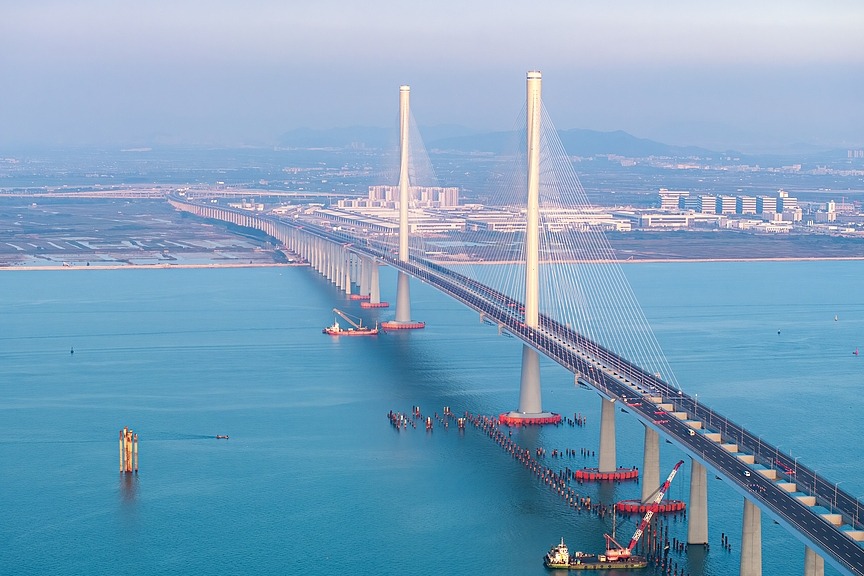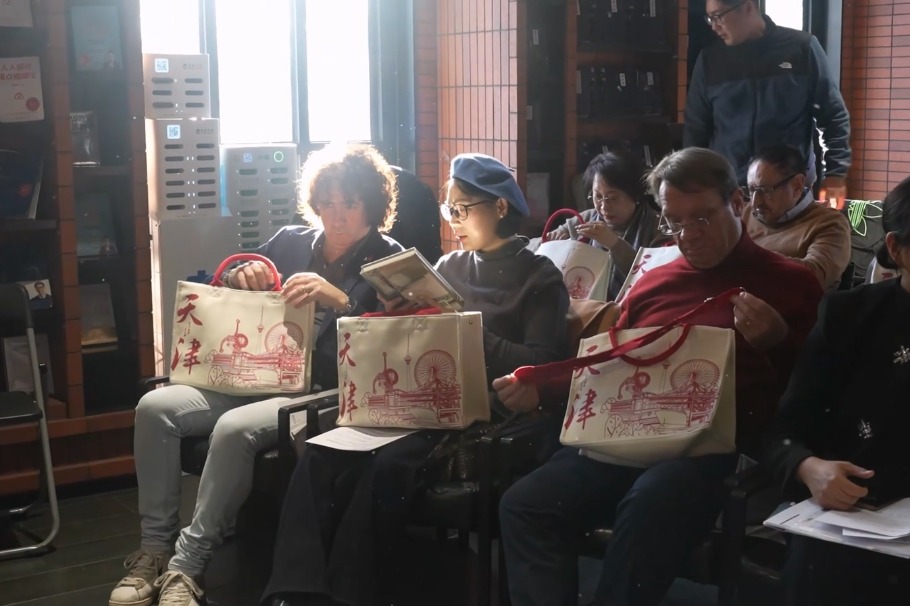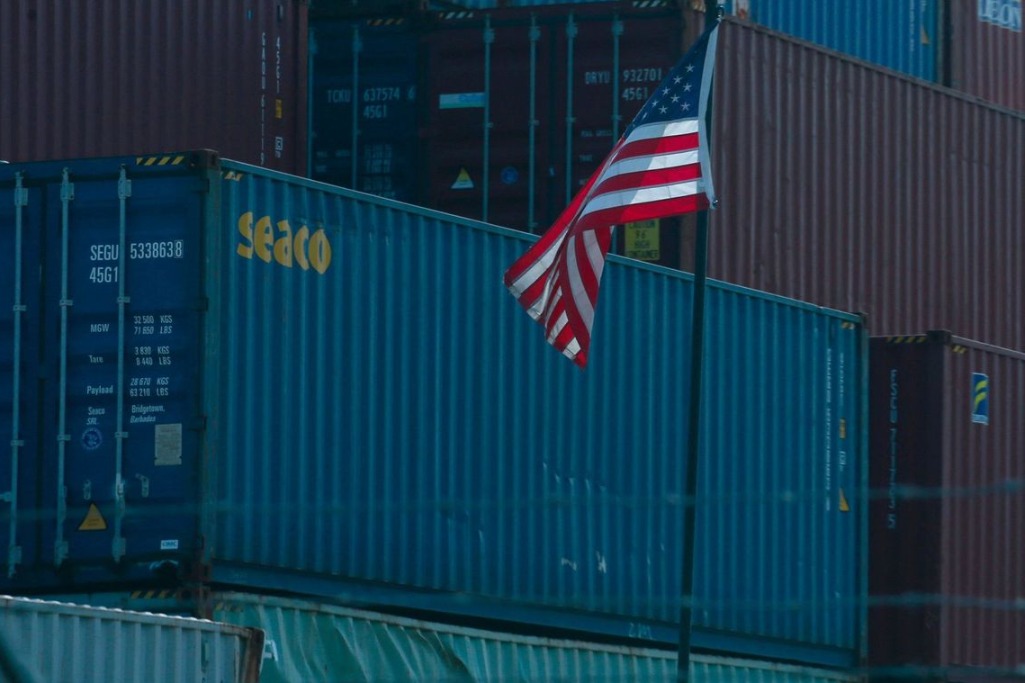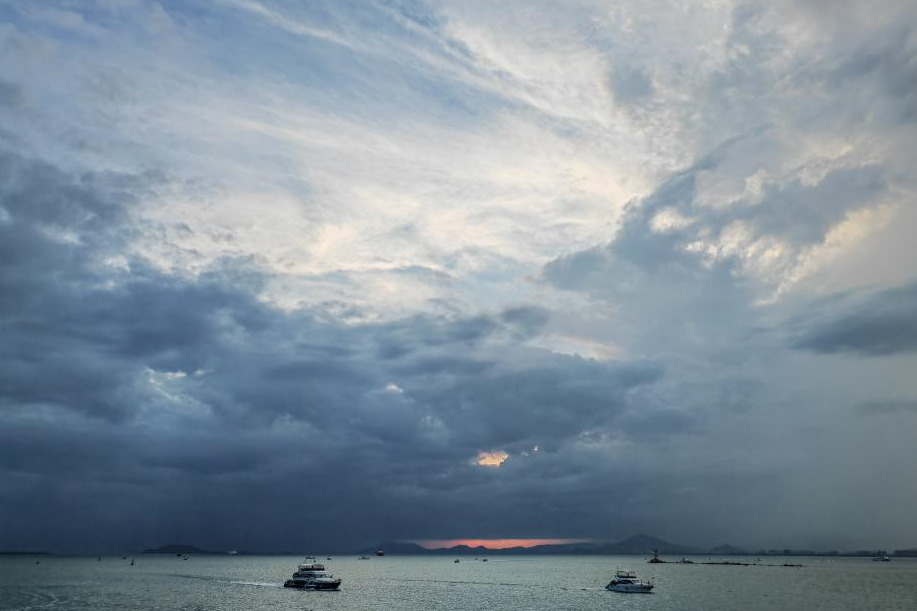Blue economy, green development vital for Global South


Editor's note: The Third China-Indian Ocean Region Forum on Blue Economy Development Cooperation was held in Kunming, Yunnan province from Dec 15 to 16. The forum, themed "Future of the Blue Indian Ocean — Development Practice of the Global South", was jointly organized by the China International Development Cooperation Agency, the People's Government of Yunnan Province, the Ministry of Fisheries and Ocean Resources of the Maldives, and the Ministry of Environment and National Beautification, Green and Blue Economy of Barbados. Below are excerpts of speeches of some participants at the forum.
Forum in line with GDI
The Third China-Indian Ocean Region Forum on Blue Economy Development Cooperation is of tremendous importance to Barbados. For us (in Barbados), this is a tangible demonstration of China's commitment to forge greater synergy across multilateral development processes with the view to accelerate the implementation of the United Nations 2030 Agenda for Sustainable Development.
China's hosting of the forum is in keeping with its Global Development Initiative, which consolidates its international cooperation agenda and is based on the following six guiding principles: a people-centered approach; development as a priority; benefits for all; innovation-driven development; harmony with nature; and action-oriented approaches.
The agenda for this year's forum includes topics which directly impact the future of a significant number of countries across the world and by extension a significant percentage of the world's population. These include climate change, island resilience and disaster recovery, implementation of the Paris Agreement, and sustainable development of the blue economy.
Reginald Farley, president of the Senate of Barbados
Oceans sustain livelihoods
For more than 4,000 years, the oceans have sustained our (Maldivian people's) livelihoods and shaped our identity as the "children of the sea". Small developing island states like ours bear a disproportionate burden of climate change despite emitting the least volumes of carbon dioxide and other toxic gases. We have voiced this concern on countless platforms, countless times.
The Maldives is doing as much as it can, with the little resources it has, to adapt to and mitigate the impacts of climate change. As a global leader in maritime affairs, China has been a reliable partner to the Maldives, thanks to their strong bilateral relationship. The successive editions of the forum have reflected the Chinese government's, especially Chinese President Xi Jinping's, commitment to address common cross-border challenges with effective responses.
Hussain Mohamed Latheef, vice-president of Maldives
Pakistan upholds marine cooperation
Oceans are a shared lifeline, a source of connectivity and economic opportunities, a custodian of the vast marine resources. The "blue economy" holds immense potential for us (in Pakistan) in areas such as sustainable fisheries, marine tourism and renewable energy.
Yet this potential comes with great responsibility. Challenges such as climate change and pollution require urgent and collective action to protect these vital resources. Our partnership with China under the Belt and Road Initiative framework has fostered knowledge exchange, technology advancement, and marine resource conservation. The China-proposed Global Development Initiative aligns with our shared visions of transnational collaboration and environmental stewardship.
Pakistan stands ready to partner with all the stakeholders to promote marine cooperation and ensure that our region maintains peace and progress and sustainability. Let us protect and promote our vital marine resources for our future generations.
Asif Ali Zardari, president of Pakistan
Time for action
The oceans connect us all; they carry more than 80 percent of global trade, sustaining the livelihoods of millions of people in fisheries and coastal communities, and offer renewable energy solutions such as offshore wind and tidal power. This lifeline is under threat. The urgency for action could not be clearer.
The adoption of the High Seas Treaty and the ongoing plastic pollution treaty negotiations highlight the power of international cooperation. Success demands collaboration — across sectors, across borders and across generations. I commend the outcomes of the last China-Indian Ocean forum, which enhanced disaster prevention and early warning systems for regions devastated by tsunamis and floods.
Now is the time for action — to forge partnerships that amplify the voices of vulnerable coastal and island nations, to prioritize resilience and investments that safeguard lives and livelihoods, while advancing the UN Sustainable Development Goals.
Amina Mohammed, deputy secretary-general of the United Nations
Blue economy a central theme
In recent years, the blue economy has emerged as a central theme for many countries across the world and for the United Nations Industrial Development Organization. It has a transformative role in advancing sustainable development. There is an estimated annual turnover of between $3 trillion and $6 trillion.
The ocean economy represents about 4 percent of global GDP. So, if the oceans were a country, they would rank as the world's seventh-largest economy. The blue economy holds a huge potential to drive stable industrial employment, protect our environment and foster prosperity on a global scale. It is a critical resource especially for coastal economies, especially for small island developing states.
The blue economy contributes significantly to not only economic growth but also food security. Which makes this an opportunity we cannot ignore.
Gerd Müller, director-general of the UNIDO
Boost regional capacity
The China-Indian Ocean region is a vital marine ecosystem and a hub for global trade, supporting the livelihoods of millions of people. However it faces escalating challenges including climate change, overfishing, marine pollution and governance gaps.
To address these challenges, it is important to foster inclusive strategies for the growth of blue economies involving local communities, the private sector and international organizations. Since its inception, China-Indian ocean forum has been instrumental in strengthening regional alignment in planning and action to deepen blue cooperation.
I hope the forum will strengthen regional capacity, promote sustainable practices in the blue economy and forge stronger partnerships for effective ocean governance.
Armida Alisjahbana, under secretary-general of the United Nations and Executive Secretary of the Economic and Social Commission for Asia and the Pacific
Early warning system indispensable
The China-Indian Ocean Region Forum is timely, as it comes in the wake of the recent 16th Meeting of the Conference of the Parties to the Convention on Biological Diversity and the 29th Conference of the Parties to the UN Framework Convention on Climate Change, both of which are deeply connected to the sustainable development of the blue economy. As such, the UNDP is delighted to join hands with the China International Development Cooperation Agency.
As for our global initiative, we are focused on strengthening early warning systems against natural disasters and helping developing countries to protect humans and marine life. We look forward to further deepening our partnership with China and building on our collective progress in protecting and restoring our planet's critical ecosystems including the oceans.
Xu Haoliang, associate administrator of the UNDP
Practical cooperation needed
The oceans are an essential part of the Earth's ecosystem, while the blue economy is an important component of the world economy. Thirty-eight countries in Africa are coastal and/or island states.
Therefore, strengthening transnational cooperation in the blue economy and fully utilizing marine resources are crucial for African countries to achieve the 2030 Agenda for Sustainable Development. The China-Indian Ocean Region Forum on Blue Economy Cooperation provides a platform for exchanges and cooperation among countries in the Indian Ocean region, including many African countries and has promoted marine ecological protection and blue economic development.
We look forward to reaching a broad consensus and boosting more practical cooperation results between Africa and China in the development of the blue economy.
Monique Nsanzabaganwa, deputy chairperson for the African Union Commission
Oceans critical to climate governance
Zero is an important concept of the Chinese government and our (Bangladesh's) stakeholders. We will integrate our goals and plans with the future development path of the Global Development Initiative, so as to manage the oceans and maintain sustainable practices in a sustainable way. At this forum, representatives from various countries shared their experiences, expectations and future plans, and I saw how the blue economy digitalization can empower the blue economy.
The oceans are critical for tourism, disaster response, promoting climate governance, implementing the Paris Agreement, and other hot-button issues. In particular, Bangladesh will work with other countries to implement the outcomes of the forum and contribute to global sustainable development.
Khalilur Rahman, high representative of the chief adviser to the Interim Government of Bangladesh
Beacon of sustainable growth
The Indian Ocean has always been a cradle of trade, culture and human connections. Today, it is at the heart of our shared aspirations for sustainable growth and prosperity. The dialogues here have reaffirmed the importance of aligning our policies and investments with sustainable practices.
Cooperation with China and other countries in the Indian Ocean region is essential for achieving these goals. Through knowledge sharing, technological support, and innovative financing mechanisms, we can build a resilient and inclusive blue economy.
Let this gathering mark the start of a decade of collaboration, where we can collectively ensure that our oceans remain a source of life, livelihoods, and inspiration for all. Together, let us act decisively and inclusively to ensure that the blue economy is a beacon of sustainable growth for all our people.
Mahinda Siriwardana, secretary to the treasury and the Ministry of Finance, Planning and Economic Development of Sri Lanka
Early warning system should be effective
The significance and vulnerability of our oceans are in stark contrast to the investments that go into keeping them safe and healthy. At present, SDG 14 — life below water — is the most underfunded of all the Sustainable Development Goals. Therefore, we are particularly thrilled to have signed the first two financial agreements with the China International Development Cooperation Agency on a multi-country initiative to develop actionable early warning systems in a bid to help strengthen the coastal communities' resilience to climate change.
Indeed, as climate-related natural disasters become increasingly frequent, having effective early warning systems in place and mainstreaming disaster risk mitigation into development strategies are more important than ever, to protect lives, livelihoods, and the ecosystems they rely on.
Moving forward, we are ready to continue working with China, and all countries, to safeguard and restore critical ecosystems, including the oceans, and embed sustainable development in the blue economy. This cannot be accomplished by any one country alone. Only through shared resolve and global cooperation can we address the challenges of our times and realize the vision of the 2030 Agenda.
Beate Trankmann, representative of UNDP in China
Maldives committed to actions
As we reflect on the milestones of this decade and set our sights on its ambitious goals, it is crucial to recognize the synergy between the UN Ocean Decade and the core principles of Global Development Initiative. Both frameworks are rooted in inclusivity, innovation and action-oriented strategies to advance the 2030 Agenda for Sustainable Development.
For the Maldives, the GDI provides a unique opportunity to advocate for equitable ocean research policies that empower our fishing communities and protect our biodiversity. The principles of the GDI-with its focus on innovation, inclusivity and results-oriented actions — offer a complementary framework for achieving the goals of the Ocean Decade.
As the GDI champions global partnerships, mobilizes resources and bridges the North-South divide, it provides the support necessary to implement key "decade programs" in areas such as early-warning systems, advancing ocean literacy and promoting innovations in sustainable fisheries and aquaculture. Together, these frameworks represent a road map to navigate the most urgent challenges rooted in our ocean. The Maldives is committed to being an active partner in this journey, leveraging our unique insights as a small island nation to contribute to global solutions.
Ahmed Shiyam, minister of fisheries and ocean resources of Maldives
BRI facilitates ocean governance
The Indian Ocean is a region of immense significance. Pakistan is a maritime nation with nearly 1,050 kilometers of coastline along the Arabian Sea. Our national maritime policy prioritizes the sustainable utilization of marine resources, aligning economic development with environmental preservation.
The oceans hold unparalleled potential to drive economic growth, alleviate poverty and ensure environmental sustainability. By integrating ocean sustainability into the Global Development Initiative framework, we can ensure a more comprehensive and interconnected approach to global development.
Through our collaboration with China under the Belt and Road Initiative framework, Pakistan has advanced innovative approaches to sustainable ocean governance. Let us continue to work together, leveraging technology, fostering knowledge-sharing and deepening partnerships to ensure that our oceans remain a source of life and prosperity for generations to come. Pakistan stands firmly committed to this shared vision and looks forward to advancing cooperation with China and all our partners here today for a better, just, inclusive and sustainable global development.
Ahsan Iqbal, federal minister of planning, development and special initiatives of Pakistan
The views don't necessarily represent those of China Daily.
If you have a specific expertise, or would like to share your thought about our stories, then send us your writings at [email protected], and [email protected].


































